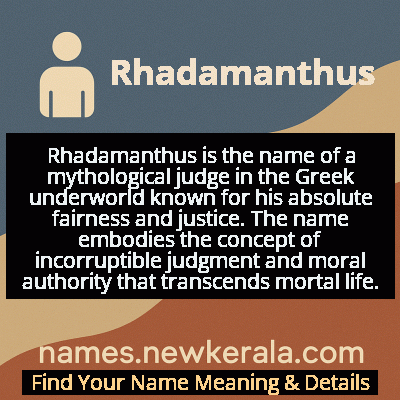Rhadamanthus Name Meaning & Details
Origin, Popularity, Numerology Analysis & Name Meaning of Rhadamanthus
Discover the origin, meaning, and cultural significance of the name RHADAMANTHUS. Delve into its historical roots and explore the lasting impact it has had on communities and traditions.
Name
Rhadamanthus
Gender
Male
Origin
Greek
Lucky Number
2
Meaning of the Name - Rhadamanthus
Rhadamanthus is the name of a mythological judge in the Greek underworld known for his absolute fairness and justice. The name embodies the concept of incorruptible judgment and moral authority that transcends mortal life.
Rhadamanthus - Complete Numerology Analysis
Your Numerology Number
Based on Pythagorean Numerology System
Ruling Planet
Moon
Positive Nature
Diplomatic, friendly, artistic, empathetic.
Negative Traits
Over-sensitive, moody, indecisive, prone to self-pity.
Lucky Colours
Green, cream, white.
Lucky Days
Monday.
Lucky Stones
Pearl, moonstone.
Harmony Numbers
1, 3, 4.
Best Suited Professions
Diplomats, mediators, caregivers, artists.
What People Like About You
Cooperative spirit, friendliness, artistic talent.
Famous People Named Rhadamanthus
Rhadamanthus of Crete
Mythological Judge
One of three judges of the dead in the underworld, renowned for his incorruptible justice
Rhadamanthus Jackson
Classical Scholar
Prominent translator and interpreter of Greek mythology in Victorian England
Rhadamanthus Papadopoulos
Academic Philosopher
Noted for his work on justice systems and ethical frameworks in classical thought
Rhadamanthus Constantinos
Modern Author
Wrote influential novels exploring themes of justice and morality through mythological lenses
Name Variations & International Equivalents
Click on blue names to explore their detailed meanings. Gray names with will be available soon.
Cultural & Historical Significance
The name Rhadamanthus became synonymous with incorruptible judgment and the ideal of fairness that transcends mortal life. In various literary works, including those by Homer, Pindar, and Plato, he is portrayed as the embodiment of divine justice, serving as a moral exemplar and a warning about the ultimate accountability that awaits all souls. His mythological significance extends beyond mere storytelling, representing the Greek philosophical concept that true justice is eternal and divine rather than temporal and human. The cultural impact of Rhadamanthus persists through centuries of Western literature and art, where he continues to symbolize the highest ideals of judicial wisdom and ethical responsibility.
Extended Personality Analysis
Individuals named Rhadamanthus are typically perceived as possessing strong moral character, unwavering principles, and a deep sense of justice. They often exhibit natural leadership qualities combined with analytical thinking and the ability to make difficult decisions without bias. These personalities tend to be serious, contemplative, and methodical in their approach to life, valuing truth and fairness above personal convenience or popularity. Their strong sense of duty and responsibility often makes them reliable and trustworthy figures in their communities or professions.
The mythological association with judgment lends these individuals an aura of authority and wisdom beyond their years. They may display perfectionist tendencies and high standards for themselves and others, sometimes appearing stern or uncompromising. However, beneath this serious exterior often lies profound compassion and a genuine desire to see justice served and wrongs righted. Their natural inclination toward fairness makes them excellent mediators and advisors, though they may struggle with flexibility when their core principles are challenged. The weight of the name often inspires them to live up to its legacy of wisdom and impartial judgment in their personal and professional lives.
Modern Usage & Popularity
In contemporary times, Rhadamanthus remains an exceptionally rare given name, primarily used by parents with strong interests in classical mythology, philosophy, or unique historical names. Its usage is almost exclusively limited to academic families, classical scholars, or those seeking a name with profound mythological weight. The name has never appeared on popular baby name charts and maintains an avant-garde status among naming choices. Modern usage tends to be symbolic rather than practical, chosen to honor the ideals of justice and moral integrity that the mythological figure represents. In recent decades, there has been a slight increase in its use within Greek diaspora communities seeking to preserve classical heritage, though it remains well outside mainstream naming conventions. The name's complexity and strong mythological associations make it a bold choice that typically reflects the parents' values and intellectual interests rather than current naming trends.
Symbolic & Spiritual Meanings
Rhadamanthus symbolizes absolute justice, moral integrity, and the eternal nature of ethical accountability. The name represents the concept that true judgment is impartial, wise, and transcends human limitations. Metaphorically, it embodies the ideal of incorruptible fairness and the philosophical notion that actions have consequences that extend beyond mortal life. In broader symbolic terms, Rhadamanthus serves as an archetype of the wise judge who sees beyond appearances to the essential truth of matters. The name carries connotations of final authority, divine wisdom, and the balancing of cosmic scales. It represents the intersection of law and morality, suggesting that genuine justice requires both strict adherence to principle and profound understanding of human nature. As a symbolic figure, Rhadamanthus reminds us that ultimate judgment is not merely about punishment but about restoring cosmic balance and affirming the fundamental order of the universe.

